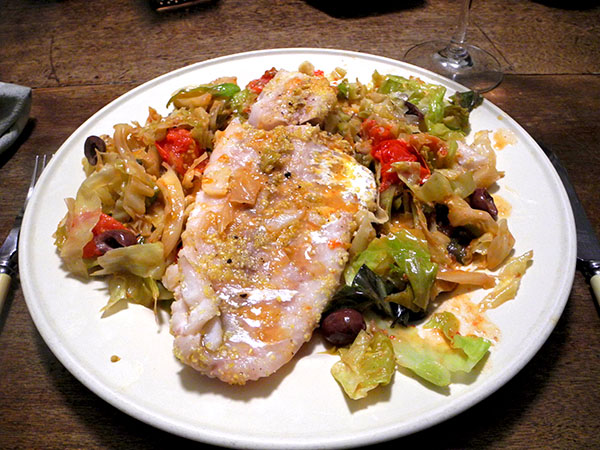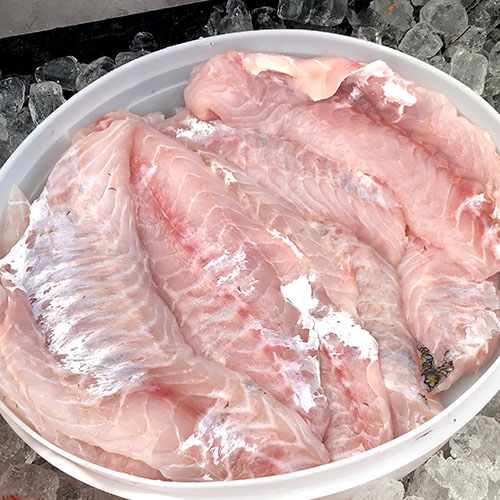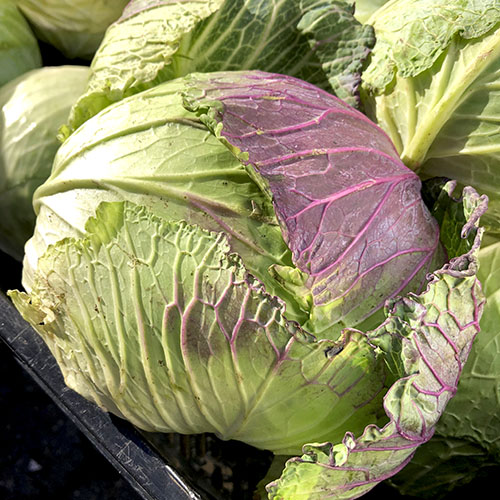
I’m not entirely happy with this meal, although I have to say it was actually pretty delicious. It’s not really my style, either in the preparation or the presentation, since, as it turned our, both seemed to make it more of a fish stew than a grill, a sautée or a bake, any of which I would prefer to work with when cooking a fairly delicate fish.
There’s actually an explanation for what I would call the raggedness of this dish. I had welcomed the chance to do something very different from the tilefish I had cooked before, and the Mark Bittman recipe I found on line seemed to fit that and several other parameters: It included white cabbage, and I had been looking for an entrée in which I might include the large head I was keeping in the crisper; it was essentially a one-dish meal, saving me the trouble of coming up with a vegetable accompaniment, and also the cooking of it; and it looked like it would be low stress, since among its other virtues, it wasn’t going to make me flip the fish half-way through the cooking process; plus, it seemed like it wouldn’t take much time to move it from refrigerator to table.
Yet what happened was that I became seriously distracted by a loss of hot water in the apartment just as I was beginning to put the meal together. It came back less than an hour later, but by then both my concentration and my mood had been somewhat fouled. I’m not even sure how I was able to bring it about in the end.
I can’t say it was a failure, but I may not try to repeat it, if only for its aesthetic inadequacies. I have a problem with what it looked like on the plates, but I have to admit that I did forget to add the prescribed garnish of a chopped herb. There was also my discomfort with what seemed to me an unwieldy process: Because of the difficulty of cooking such a large amount of cabbage, and the fact that one of the ingredients was acidic, I found it necessary to use 2 pans for what should have been an operation requiring only one.
ADDENDUM: Now that I’ve gotten all the way through a description of this meal, I’m thinking the recipe could be saved, and I might do it again, making certain adjustments to allow for my sensibilities.
The pictures below are of the two main ingredients as they appeared at the Union Square Greenmarket.


- two 8-ounce tilefish fillets from Pura Vida Seafood, seasoned with sea salt and freshly-ground black pepper, their skin sides dredged with corn flour (alternatively, wheat flour), sautéed, breaded side down, in a third of a cup of olive oil over a medium-high flame inside a large, -inch seasoned cast iron pan until they had become crisp on that surface, removed and set aside on a warm platter, and 3 quarters of a pound or more of leaves peeled off from a washed head of a one-pound Savoy cabbage from Norwich Meadows Farm, gathered, stacked, and shredded, added to the pan in which the pollock had been seared, and cooked, stirring occasionally until the cabbage had wilted, then, with the cabbage now wilted and occupying a much smaller volume, it could now be placed inside a large heavy, vintage, oval tin-lined copper fish pan, and 8 halved Backyard Farms Maine ‘cocktail tomatoes’ from Whole Foods Market partially embedded in the cabbage, followed by a third to a half cup of pitted Gaeta olives and a tablespoon of rinsed salted Sicilian capers, both from Buon Italia, and about half a cup of white wine, stirred together over medium heat for about 10 minutes, or until the tomatoes had softened and the cabbage had become tender, at which point the pollock fillets were placed, skin, or dredged side up, on top of the cooked vegetables and the contents of the pan cooked over a medium flame, undisturbed, until the fish had cooked through, or 5 to 10 minutes more, served on 2 plates with the vegetables surrounding the fillets, everything drizzled with the small amount of pan juices that remained, garnished with chopped lovage from Two Guys From Woodbridge (although in the end I completely forgot the lovage part)
- the wine was an Italian (Piedmont) white, Banfi Piemonte Principessa Gavia Gavi 2016, from Flatiron Wines
- the music was Mozart’s 1779-1780 opera, ‘Zaide’, Ian Page conducting the Orchestra of Classical Opera